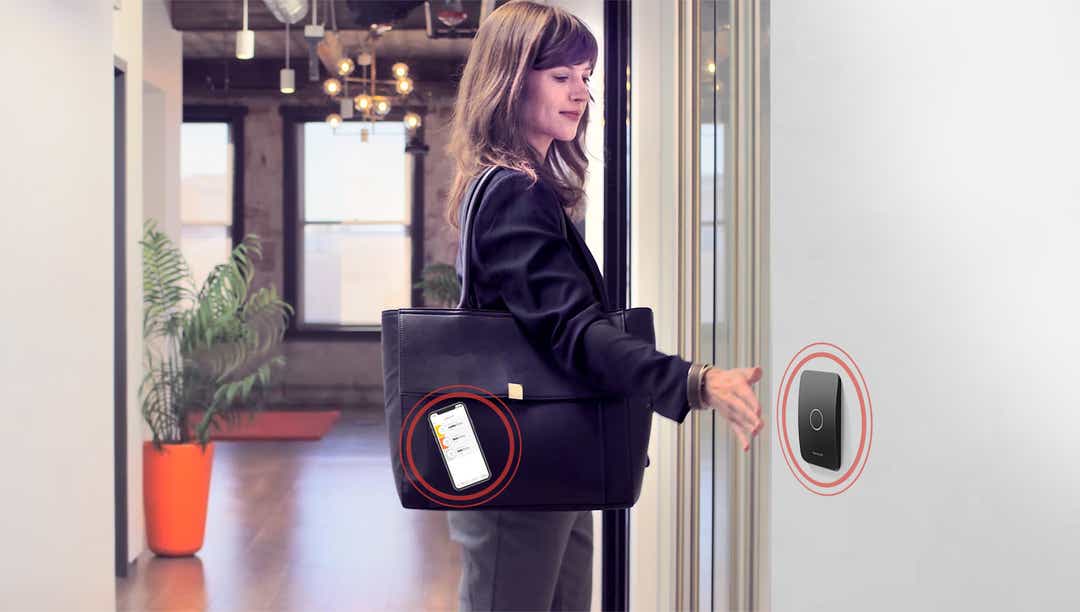James Segil and Alex Kazerani thought they were onto something when they introduced technology to make it easier for workers to enter office buildings by using their smartphones instead of badges.
Then the pandemic hit and changed everything.
Their company, Openpath, which gets buildings to replace legacy doors with state of the art keypads and software, is now focused on "contactless" entries, and has seen more action in the last few months than in its two years of operation.
"Our June was the biggest month we've ever had," says Segil. "And July is shaping up to surpass that."

Real estate: Will the remote work craze sparked by COVID-19 sound a death knell for office buildings?
Education: Back to school: Working parents will need help from employers
Thanks to the "Return to Work."
"The driver before was to future proof offices," Segil says. "Then came the coronavirus."
In two years, Openpath has upgraded some 10,000 doors nationally, serving 250,000 people. (Clients include office buildings, schools and houses of worship.) Now, with the pandemic and a new $36 million investment from a variety of firms, including security firm Okta Ventures, it's looking at adding many more doors by the end of the year.
How many? "Honestly I don’t know," says Segil. "So hard to tell but hopefully we can double in the next year and do in one year what we did in two given the demand we are seeing in the market."
Openpath's software communicates with its hardware reader, and uses bluetooth, WiFi, LTE and beacons to communicate with the phone. It lets people walk through doors using the power of their portable computers.
Originally, people would gain entry without removing the phone from their pockets or purses, but they had to authenticate by pressing their hand on the reader.
Openpath now offers a new option for those who don't want to come into contact with germs: now they can just wave their hand at the reader instead.
Before Openpath, Segil and Kazarani founded Edgecast Networks, a content delivery network that helped websites like Hulu, Twitter and LinkedIn push out huge amounts of data to a thirsty internet. They sold it to Verizon in 2013 for $400 million.
They hatched their new idea in 2016, but didn't debut it until 2018.
The original idea: how to use the mobile phone to replace the badge. The challenge was huge. At the time Segil and Kazerani began, along with fellow founders Samy Kamkar, Phil Goldsmith and Rob Peters, some 98% of offices used badges and legacy doors, says Segil.
It has since signed up large buildings, as well as corporate clients including Domino's Pizza and the NBA's Los Angeles Clippers to use the system at their headquarters.

The cost to upgrade is usually around $1,000 per door, says Segil, along with the software subscription, which ranges from $5 to $25 monthly.
Segil and the rest of the Openpath staff are all working remotely, with a few hardware specialists still coming in to the Culver City headquarters. He expects the team to be out for the remainder of this year, and many folks to start returning in early 2021.
As do his clients. "Large real estate portfolios are eager to have people come back as soon as possible," says Segil. "Back to work will probably happen sooner than back to school, but who knows?"
Jonathan Skogmo, the founder of Los Angeles-based Jukin Media, recently upgraded to Openpath's "wave" technology to make his 200 employees feel more comfortable about returning to work later in the year.
"We want to make it as safe and comfortable for everyone," he says.
Eric Roseman, the vice-president of technology for Lincoln Properties, which manages 200 million square feet nationally, says the "wave" approach gives people a choice.
"Anything we can do to make them more comfortable is important. For those who don't feel comfortable touching the reader, now they have an option," he said.
As for the business outlook, Openpath has no plans to explore the consumer market, with frictionless, contactless entryways for the home. "We have plenty to keep us busy with the business-to-business market."
Follow USA TODAY's Jefferson Graham (@jeffersongraham) on Twitter.
"entry" - Google News
July 17, 2020 at 11:57PM
https://ift.tt/30kmlxw
Next-generation office entry sees surge in interest during COVID-19 pandemic - USA TODAY
"entry" - Google News
https://ift.tt/3f5ZAUJ
https://ift.tt/3d6LMHD
Bagikan Berita Ini














0 Response to "Next-generation office entry sees surge in interest during COVID-19 pandemic - USA TODAY"
Post a Comment